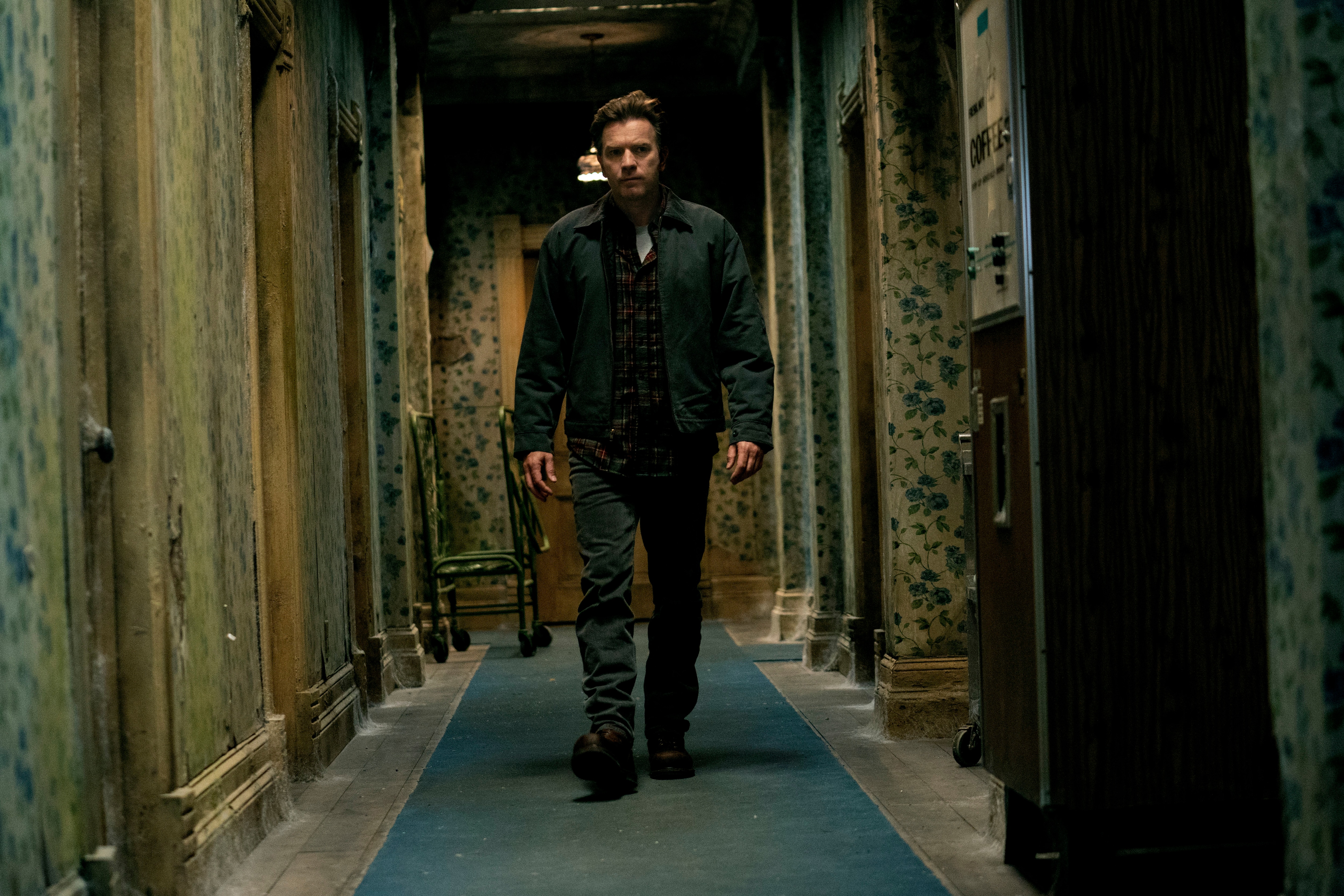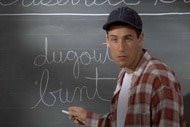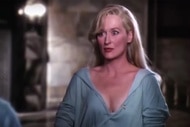Create a free profile to get unlimited access to exclusive videos, sweepstakes, and more!
Doctor Sleep's ending is an argument between King and Kubrick. Who gets the last word?

Only Stephen King could shrug off Stanley Kubrick.
King has never been shy about his displeasure with Kubrick's adaptation of The Shining, and when it came time for him to write a sequel to that legendary story, he reaffirmed his dislike of Kubrick's interpretation. In the Author's Note that follows Doctor Sleep, King made sure to note that he had not written a sequel to the movie, and called his books the "True History of the Torrance Family." It was one master brushing off another, getting the last word on the page.
When it came to adapting Doctor Sleep for the big screen, writer/director Mike Flanagan knew that he could not give Kubrick's film — a movie that looms so large in the pop culture consciousness that a whole other movie was made just to cover all the dissections of it — the brush off, nor did he particularly want to. Flanagan called Kubrick's The Shining a "monolithic" work in the horror cinema landscape, something even King has to acknowledge. As he told SYFY WIRE, the only choice for Flanagan was to find some way to reconcile the two stories, King's novel and Kubrick's film, into one as Doctor Sleep took the leap to the screen.
The result is a film with a fascinating third act that in many ways plays out like a decades-in-the-making thematic argument between two legends.
**Spoiler Warning: There are full spoilers for Doctor Sleep below.**
Flanagan begins his merging of King and Kubrick's respective narratives with certain obvious alterations to Doctor Sleep. In King's version of The Shining, The Overlook Hotel burns down. In Kubrick's, it does not, so Flanagan gave us a vivid recreation of a rotting, abandoned Overlook complete with Kubrick's legendary carpet. Kubrick also chose to kill the Overlook's chef, Dick Hallorann, where King left him alive, leaving Flanagan to justify his presence in Doctor Sleep by having him simply appear as a benevolent spirit.
These changes aside, book and film progress in roughly the same way — apart from a few abbreviations and deleted subplots — up until Doctor Sleep's climax. In King's novel, the final confrontation between Dan Torrance, Abra Stone, and Rose the Hat unfolds at an RV park on the site where the Overlook once stood. Since Kubrick's Overlook is still standing, Flanagan reframes the showdown to take place within those haunted halls, and it's here that the reckoning begins for both the characters and the two disparate versions of The Shining.
Kubrick enters this arena with a definite advantage because he built it. For a great many horror fans, it's never gotten better than Kubrick's eerie, cavernous Overlook Hotel with its gold ballroom and blood-soaked elevators, and Flanagan and company took great pains to bring that version of the Overlook back to haunting life. It feels like the same place, from the massive chandeliers in the Colorado Lounge to the wallpaper in the wing where the twin girls wait. Even now, Kubrick's Overlook feels as inescapable as it always has, to the point that Flanagan weaves it into the background of the rest of Doctor Sleep.
Flanagan's decision to place Danny's collection of ghost boxes in a mental representation of the hedge maze where his father died is brilliant, as is the decision to explain the Overlook's continued existence as it simply being left to rot. Jack Torrance only killed two people in 1980, and one of them was himself, so does it really make sense that the hotel's owners would simply board up their lucrative property after that (having kept it open following previous tragedies) and done nothing with it for nearly 40 years? Not exactly, but as anyone who's ever tried to lay out a floor plan of Kubrick's Overlook will tell you, very little about that place makes sense. It just is.
King once famously described Kubrick's The Shining as "a big, beautiful Cadillac with no engine inside it," and has complained about the film's coldness and the impact that Kubrick's own skepticism over the supernatural had on the piece. For King, a nakedly emotional and instinctive writer for better or worse, Kubrick's film just didn't bring enough heart to an essentially tragic tale about a family being picked apart by a powerful force that's bigger than they are. Anyone familiar with Flanagan's work on things like The Haunting of Hill House knows that he's also an emotional storyteller, and so Doctor Sleep was never in danger of being stripped of its heart. The scene in which Dan collects his eight-year sobriety chip and dedicates it to his father is perhaps the most heartwrenching moment in the film, and helps to restore the narrative of alcoholism (a powerful force that's bigger than Dan, and a key metaphor in The Shining novel) to the story in a way that Kubrick never elaborated on. There's a heart to Doctor Sleep on film that Kubrick never captured, so that's a point for King.
King also made sure to notch another key point for himself by making Doctor Sleep a tale that could not be misinterpreted by skeptics. In the sequel, the "shining" is given literal physical substance in the form of "steam," the psychic essence that is food for the villainous True Knot, led by Rose the Hat. Unlike Kubrick's film, it's not a story in which nearly all of the supernatural stuff (except for whoever opened that walk-in fridge) can be waved away as something happening in a character's head. King gave form and flavor to his supernatural creatures the second time around, and even if Flanagan had wanted to brush in more ambiguity, he'd have had a hard time with it.
There are many different ways to frame the disparate dynamics in the two versions of The Shining, but much of it boils down simply to the notion of haunted places vs. haunted people.
King's story is one of outside forces acting on and inflaming tensions and tendencies already present in a family, ultimately ripping it apart, while Kubrick's story is one of evil lurking within, waiting for a fertile ground in which it can take root. King's story is about the edge of the knife that troubled people are often perched on and the forces that push them one way or another, while Kubrick's is about the inevitability of trauma and violence, particularly when they're suppressed and undiscussed.
These two approaches dance side-by-side to great effect in the Doctor Sleep movie when Dan Torrance sits down at the site of his father's unraveling: The bar in The Gold Room. There, Lloyd the bartender takes on the guise of Jack Torrance, and begins ranting about taking the "medicine" of alcohol to deal with all the soul-destroying disappointments of his life.
Here, the empathy and serenity Dan Torrance has learned to cultivate faces off in a very direct way with the inevitability of his own father's cursed existence, an existence that sought for years to claim him, too. "Lloyd" is the avatar for the same cycles of violence and rage that claimed Jack, come to claim Dan too with a single drink, before Dan swats it away and moves on. It could just as easily be King and Kubrick perched on either side of that bar, debating the themes of The Shining.
The reckoning comes to a head when Dan refuses his father's offer of a drink (a moment, by the way, that Abra doesn't see, which feels like a very Kubrickian point) and heads out to battle Rose the Hat. Their showdown, which unfolds in the Colorado Lounge, hauntingly mirrors the physical fight — what alcoholics might refer to as "the turning point" — between Jack and Wendy Torrance in The Shining, right down to a tumble down the staircase. This feels like Kubrick's monolithic, inevitable evil creeping back into the narrative to pull Dan back into the pattern that destroyed his family. The literal ghosts of the past demand that he follow his father, to the point that they drag him screaming into an eerie physical mimicry of Jack's final moments. With Rose defeated, Dan is possessed by the hotel and lumbers around with an ax in search of Abra. History repeats itself. You'll never escape the maze.
Despite all of this, though, it's King who gets the last word via Flanagan's efforts to mimic the author's original ending to The Shining. Dan turns the hotel against itself by rigging the old boiler to blow, burning the Overlook down with him inside as Abra escapes to shine on. The decision to have Dan go down with the Overlook — in the book, he survives — feels like a very Kubrickian one, in the sense that Dan can't destroy the Overlook without letting it drag him down too, but the emotional victory feels true to King. Dan Torrance is able to reckon with the past in a way his father never could, and, in so doing, die at peace.
Even beyond that, though, there's a bigger thematic victory for King in all of this.
The Shining's famous final shot reveals that Grady's assertion that Jack had "always" been at the Overlook was in some way true, and Flanagan's film reaffirms this by showing us that Jack Torrance has well and truly been claimed by the hotel. Dan Torrance is not, and at the end of the film, Abra Stone sums up the optimism inherent in Doctor Sleep's story of recovery and amends perfectly with three words that sound like vintage King: "We go on."














